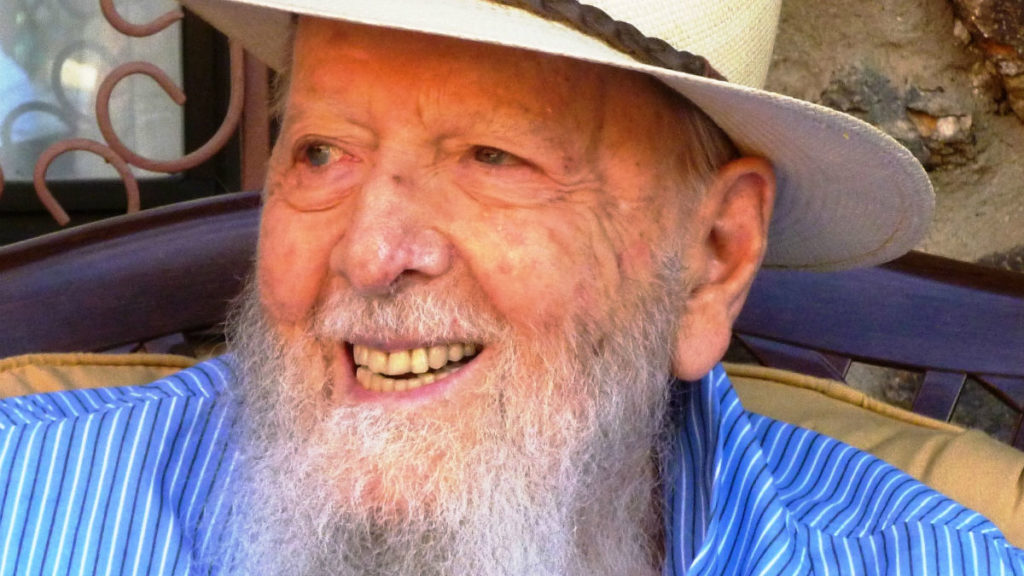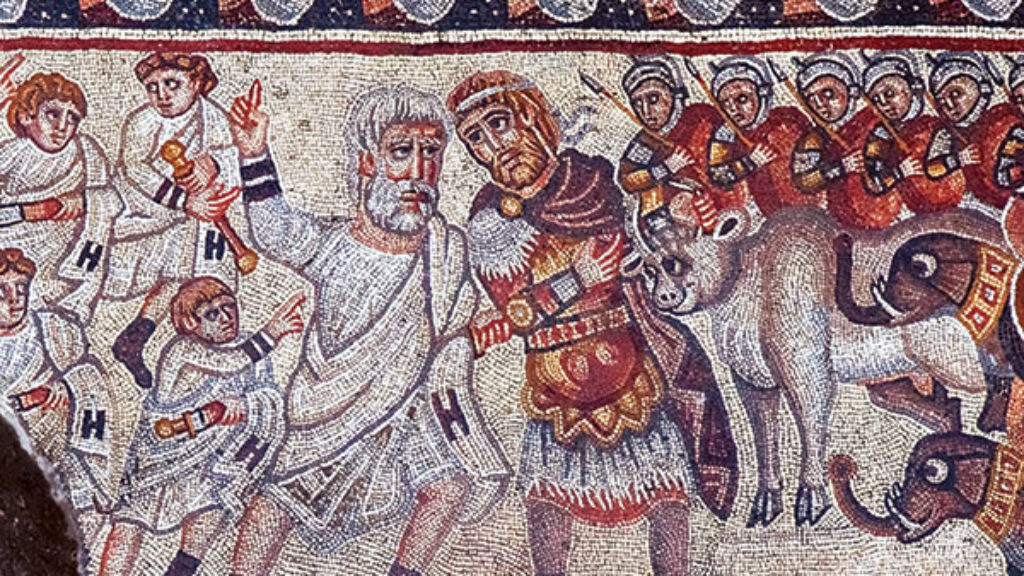We Are Really Not One
Allan Arkush must be developing quite a reputation for himself as JRB’s chief of its pro-Israel thought police—I suppose I should be honored. Joshua Cohen went on to receive a Pulitzer Prize for a recent book for which Arkush attempted a no-less comically inept attack in these same pages. Sadly, he has not improved with practice.
I suppose it’s possible that there are people in the world who might consider Arkush a more reliable judge of a book on the history of the debate over Israel in the United States than, say, David Myers, who called my book one “that strikes an impossible balance: massively knowledgeable, readable, fair-minded, and hard-headed. Both novice and expert will derive great benefit from this deeply engrossing book,” or Shaul Magid, who noted that “We Are Not One is learned, fact-based, unvarnished, and full of fresh insights. Highly recommended.” Perhaps there is even someone who thinks Arkush has a better grasp of the role of Israel in its negotiations and the Palestinians and the United States than Aaron David Miller, who termed it, “Deeply researched and beautifully written,” or the editors of the New Yorker, who, adding it to the magazine’s list of the best books of 2022—as it was published too late to be initially included—judged it to be a “fearless account” before adding that the book “provides a scrupulous history of the crucial debates over Zionism, anti-Zionism, Palestine, the role of memory and the Holocaust, and America’s interactions with Israel.” I repeat, perhaps there are such people. But I must confess that, at this point in my life, I don’t think I have ever met any of them.
Comparing my work to that of the extremist anti-Zionist, anti-vaxxer, pro-Putinist, and pro-Assad cheerleader, Max Blumenthal, Arkush writes that I have “gone on to produce a book with some of the same flaws as Blumenthal’s.” This is beyond ridiculous. First, literally no one in the world has done more to expose Blumenthal’s hate-filled screed Goliath than I did. (Nor has anyone experienced greater public abuse as a result from the likes not only of Blumenthal but also from Philip Weiss, Glenn Greenwald, Andrew Sullivan, Corey Robin, and Charles Manekin, to name just a few.) I wrote these things, moreover, about a book published by my employer at the time and thereby risked my own livelihood in the process. Anyone who wants to bother to google our names together will see this, to say nothing of the fact that Arkush is comparing a work supported by sixty-one tightly spaced pages of notes, containing well over a thousand sources to one that is nothing but egregiously unsourced and often hateful and hysterical anti-Zionist propaganda. The indefensible smear, however, is a clear marker of how Arkush plans to proceed, before even attempting to address my book’s argument and evidence.
Now to substance. (I apologize in advance for the extraordinary length of what follows, but it is necessary due to the remarkable amount of nonsense, falsehood, propaganda, and ad hominem character assassination contained in Arkush’s review.)
Arkush writes, “Alterman explains Theodor Herzl’s transformation into a Zionist as a response to the demoralizing ‘antisemitic fury’ directed in Paris against the alleged spy Alfred Dreyfus. This is a well-known biographical myth, and Jacques Kornberg, Shlomo Avineri, and others have demonstrated that Herzl was not particularly moved by the anti-Dreyfus outbursts at the beginning of 1895.”
Here is what I actually wrote: Herzl “was deeply affected by the spectacle of what would become France’s Dreyfus affair, which began in 1894 and was not resolved until 1906.” And “the antisemitic fury unleashed at the innocent Captain Dreyfus disabused Herzl (and many Jews with him) of the belief that the 1791 political emancipation of France’s Jews would end their persecution.” Here is what Walter Laqueur wrote in what is widely understood to be the most comprehensive history of Zionism: “It was in Paris, too, that he was again confronted with the Jewish question. For these were the years of the Panama Scandal and the beginning of the Dreyfus affair. Jews were prominently implicated and there was a resurgence of antisemitism in France as well as in other countries. Jewish topics began to preoccupy Herzl and appeared more frequently in his writings.” My short description is consistent with Laqueur’s and is obviously not meant to be comprehensive. This is, after all, not a book about Dreyfus or the origins of European Zionism. When Arkush complains that “Alterman, for his part, gives his readers very little sense of the true magnitude of ‘the Jewish problem’ in Herzl’s day,” well, this is also false—there is plenty of discussion of this. Even if accurate, however, it would be irrelevant. Remember, Arkush is putatively reviewing a history of the US debate over Israel. There was no debate in the US over Herzl’s motivations at the end of the nineteenth century. There was very little serious discussion of Zionism in the US for decades afterward, save for its denunciation by Reform Jews and starry-eyed embrace by premillennialist Christians. The topic is treated appropriately given its entirely tangential nature of the history I’ve written.
Arkush quotes me as saying that “American Zionists . . . abandoned ‘the desperately difficult cause of “rescue”’ of European Jewry during World War II because that effort ‘could not compete with the thrilling potential of the first Jewish state in nearly two millennia.’” In fact, I lay out the various means in which some American Jews tried and ultimately failed to help European Jews before the majority of them gave up and wholeheartedly embraced the Zionist cause instead. I address the “enormous controversy among historians over whether the intense focus on Palestine came at the expense of rescuing Jews from the Nazis.” I note, “The historian Aaron Berman has argued that the Zionists’ decision to give first priority to efforts in Palestine weakened the ability of American Jewish organizations to focus on the crisis in Europe: ‘Concentration on the statehood issue meant that few resources were left for the rescue campaign.’ This may be true, but any other approach was unlikely in any case. Not only did few people know of the extent of the genocide underway, but it was (and remains) difficult to imagine how American Jews might have prevented or mitigated it.”
Arkush writes: “Alterman voices no disapproval, on the other hand, of American Jews who chose at that time not to ‘hop aboard the Zionist express.’” Once again, Arkush does not appear to understand that my book is a work of history, rather than Hasbara-style propaganda. My job is not to voice disapproval or approval, for that matter, of anything. Rather, it is to define the role that Berger and his organization played in the US debate over Israel. I note that the group was taken seriously in the US State Department and by the New York Times, and therefore, “While the group’s membership was small and geographically concentrated, and even in those places remained a minority, it continually punched well above its weight politically.” Is this false? Does it sound like approval? Does it sound like approval when I note that “although Times publisher Arthur Hays Sulzberger never formally joined Berger’s organization, his newspaper continued to treat the group as a serious political and ideological force long after this might have been journalistically defensible”?
There is a great deal of dime-store psychoanalysis of my motivations in Arkush’s alleged review, almost all of it voiced on the basis of that infamous journalist weasel word “seems.” For instance (italics mine): “It seems as if Alterman’s latter-day rejection of Israel has led him to a rather jaundiced reassessment of the Zionist project as a whole. . . . They are, it seems, simply too Zionist for him. . . . It seems more likely, however, that Alterman really believes that only people wearing Exodus-tinted glasses could possibly see much that is worthy of praise in the way that the Jewish state has conducted itself over the past seventy-five years. Moreover, he seems to be pleased by evidence that others are coming around to the same point of view.” As I have frequently pointed out in my writing on the media, a journalist can say literally anything he wants, evidence be damned, as long as it is preceded by the word “seems.” Not for nothing did Hamlet tell Gertrude: “Seems, madam! Nay, it is; I know not ‘seems.’” I also like this one: “Alterman evidently feels”—as if Arkush had any idea about how I “feel” about anything. There’s plenty more evidence that Arkush’s real complaint here is simply that a historian has addressed topics he wishes everyone would just ignore. For instance, he writes, “While he dwells extensively on Israel’s responsibility for the creation of the Palestinian refugee problem, he has very little to say about its concurrent absorption of vast numbers of Jewish refugees, including hundreds of thousands fleeing Arab lands. Nor does he note how many of the new immigrants were settled in border regions where they were regularly the victims in the years to come of cross-armistice-line attacks by Palestinian fedayeen.” As it happens, one of the reasons I wrote this book is because it is so hard to discuss the conflict in person. There are many problems with this, but one I discuss in the book is the tendency of people on all sides of the argument to reply with some version of whataboutism whenever a person mentions a fact or a piece of evidence another would prefer to avoid. I suppose I should thank Arkush again here for so clearly demonstrating what I had in mind when I began the book. Yes, I do not spend much time on the events he describes. Here, yet again, he is complaining about the book I did not write—a history of Israeli-Palestinian conflict—rather than the one I did: a history of the debate over Israel in the United States. I say so right there on page three: “This book is a history of the debate over Israel in the United States: about its founding, its character, its conflicts—both internal and external, especially as they relate to the Palestinians—and many other issues. It pays particular attention to the actions and concerns of American Jews, as historically they have stood at the center of the debate, oftentimes defining its terms and policing its borders. It is not a book about Israel itself, US diplomacy in the Middle East, or the fate of the Palestinian people inside or outside Israel’s borders.” Does Arkush think that the Nakba is not a central event in the history of this debate? Does he think that the events he would prefer to discuss are? Does he think, moreover, that the latter obviates the former? Once again, does he know what it is to write a work of history? If you think I make too much of his whataboutism, he then goes on to do exactly the same thing, writing, “The relationship between the fedayeen attacks and Israel’s 1956 Sinai campaign is debatable, but this is not a subject that Alterman chooses to address. As far as he’s concerned, Israel’s ‘co-conspiratorial’ attack with the French and British was the result of Egypt’s seizure of the Suez Canal and its shutting of the Straits of Tiran to Israeli shipping. He says nothing at all about the massive Soviet arms deal with Nasser in 1955 that, more than anything else, inspired Ben-Gurion to launch a preemptive attack on Egypt. Omitting any reference to such calculations is, of course, precisely ignoring the historical context, and is a way to make Israel look more mercenary than self-protective.” Again, the debate in the US was over the invasion, not an arms deal that took place fourteen months earlier (as if an arms deal is an excuse for an invasion in any case). The fact is that I take no position on the rightness or wrongness of the Israeli/French/British attack. What’s more, I offer the reader the necessary context to understand why it happened when it did. Hence this sentence: “The attack came in response to the July 26, 1956, announcement by Egypt’s president, Colonel Gamal Abdel Nasser, that he had nationalized the nearby Suez Canal and shut off Israeli shipping in the Straits of Tiran, effectively blockading Israel’s southern port of Eilat and cutting off its access to the Indian Ocean.”
Arkush’s discussion of my chapter on Exodus is among my favorite parts of his alleged review. When I note that Jeffrey Goldberg (along with John Kerry and a number of liberal critics of Israel) was moved by the book and film Exodus, he writes, “It is unfortunate, Alterman evidently feels, that someone naive enough to have been inspired by Uris has attained such a position.” Nowhere do I say any such thing or imply that Goldberg is naive about anything at all. I, too, was deeply moved by Exodus when I read it—and gave a report on it to the parents of my fifth-grade classmates. I do not mention this because . . . wait for it . . . the book is a history. Then comes my favorite sentence in the entire review. He worries that I am overly critical of those demonstrating “excessive admiration for, and vicarious identification with, the real-life Ari Ben Canaans—such as Moshe Dayan.” Arkush calls himself a historian and yet he has written, and JRB has published, the words “the real-life Ari Ben Canaans.” Here I must point readers to Joshua Cohen’s response (“It’s a Novel: An Exchange,” August 2021) to Arkush’s hit job on his book, The Netanyahus, in which he constantly had to remind Arkush that he was (allegedly) reviewing a novel, and that fiction and real life are not the same thing. For the record, and I can’t believe I have to say this, there has never been any such person as a “real-life Ari Ben Canaan.” (I like to think I knew this at ten years old when I gave my book report, but, admittedly, I cannot be certain.)
Yes, there’s more—plenty more, alas. Arkush writes: “He knows, for instance, that the American Jewish Committee was for a long time quite cool toward Zionism and deduces from this fact that the magazine it published, Commentary, must have been consistently hostile to Israel until the Six-Day War.” In fact, I do spend a lot of time on the AJC’s initial coolness to Israel in the pre-67 period and note, for instance, that “AJC members concurred and began to lobby the Israeli government to accord its Arab population more rights and greater respect. They even took an interest in monitoring the harsh treatment meted out to both Arab refugees and those Arabs who remained inside Israel, for a brief period paying staff to document it. But they found they had little leverage with the Israelis on such matters and eventually decided to keep their concerns to themselves.” And while Arkush thinks there was “nothing at all that smacks of animosity toward the country” for the decade before the 1967 war, I do not say there was. I do note, however, that its editor for most of this period, Norman Podhoretz, “first came to the attention of Commentary’s editors when, in 1951, he penned a condescendingly hostile letter about the Israelis to his mentor, Lionel Trilling. Following a six-week visit there, he called Israeli Jews ‘a very unattractive people,’ finding them to be ‘gratuitously surly and boorish’ as well as ‘arrogant’ and ‘anxious,’ and therefore had little hope ‘to become a real honest-to-goodness New York of the East,’ as if this had been—or ought to be—the Zionist ideal. Trilling passed the letter on to then-editor Elliot Cohen, and Podhoretz was invited into the magazine’s inner circle.” If Commentary’s post-1967 position under this very editor does not need explanation, well, I don’t know what does.
What else?
Arkush writes, “The 1970s left-wing group Breira, which he discusses, was short-lived, but J Street, T’ruah, and Americans for Peace Now arose. Although Alterman regards the emergence of these organizations as relatively positive developments, he doesn’t explicitly endorse them. They are, it seems [seems!], simply too Zionist for him.” Actually, I like the folks who founded Breira—especially the rabbis a great deal—I had dinner at a kosher restaurant on Columbus Avenue with one of its founders just four days before this alleged review appeared. In my acknowledgments, I credit another, who is no longer alive, with being the person most responsible for inspiring my journey into Jewish scholarship more than thirty years ago. I have friendly relations with others and have received compliments on the book from a few. (Many have sadly passed away, as we are talking about the early 1970s.) And yet, I do not “endorse” Breira because I “endorse” nothing and no one in this book. It’s a history.
Arkush complains: “We Are Not One has almost nothing favorable to say about the State of Israel apart from some brief words of praise for Yitzhak Rabin’s efforts at peacemaking.” This is false but also irrelevant because, um, it’s a history.
He then speculates, rather wildly, “This is either because Alterman genuinely believes there is nothing else that can be said in favor of the country or he doesn’t want to admit that there is. If the latter is the case, it may be because he wants to steer clear of yielding to pro-Israel pressure the way that Neera Tanden of the Center for American Progress [CAP] did, by his account, some years ago. After the center’s website, Think Progress, published a series of posts and tweets critical of Israel and AIPAC, Ann Lewis, a ‘close adviser to Hillary Clinton, as well as a frequent speaker at AIPAC events . . . read Tanden the riot act about Think Progress’s treatment of Israel, accusing it of, among other sins, failing to balance its criticisms of Israel with compliments for its virtues.’ Tanden, Alterman reports, buckled under. Maybe he wants to show that he won’t.”
Do I really need to explain to Arkush that the incident he describes involved a liberal think tank’s politically committed website and its Twitter feed, which is a rather different sort of task than writing a 512-page scholarly work of history devoted to describing these events? I was never associated with Think Progress, but I was a senior fellow and a columnist at CAP at the time of these events—which I mention in the book—and would be happy to explain the many differences in these respective tasks to him privately should he remain confused.
Next—and sorry, but here we go again—he beats this dead horse: “There are other liberals who have noted these developments, welcomed them, and seen in them reason to hope for a counterforce that could still have a constructive influence on Israel. But Alterman is no longer prepared to share such an outlook.” Perhaps those “other liberals” will write their own books. Once again, this is a history. . . . Now get ready for another “seems” as Arkush follows this up with: “He rejects, it seems, any kind of support for it at all.”
Then there is this, perhaps the single most outrageous passage in the entire review: “Last spring, in a talk to a left-leaning audience at Tel Aviv University, he made explicit what is not completely spelled out in We Are Not One:
I’m sorry, I’m abandoning you and your colleagues. I’m going to devote my attention to rejuvenating American Judaism. Those are my people. I used to have in my will Israeli peace groups, I’m changing my will and I’m funding American Jewish scholarly and charitable institutions.”
I did say this, and I did do this. But it has no place in a review of my book. It was a private decision that I mentioned in response to a question I was asked by a member of the Tel Aviv University audience. Since Arkush brings it up, I will explain that the reason for this decision is the fact that I feel myself to be extremely generously compensated by an institution that serves students and others who are being educated by a profoundly underfunded public university under circumstances far less fortunate than my own and who are also part of my immediate community to which I feel a strong sense of responsibility. Moreover, it is also an institution that educated my father and therefore helped to make my privileged upbringing possible. There is also, of course, the crucial role that the City University of New York has played in the life of my city and the Jewish community—especially its intellectual community—into which I was born and where I continue to live. So, I’ve given instructions that, upon my demise, an Alterman Family Professorship of American Jewish History, Literature and Culture will be established at my home university, Brooklyn College, with the part of my estate I am not leaving to my daughter. (I have also retained in my will a place for the rabbinical group T’ruah, which does a lot of work in Israel.) Am I actually reading in an American magazine that calls itself the Jewish Review of Books that I somehow need to defend this?
Finally, while it is any reviewer’s right to be selective in what they choose to address about any work, I find it interesting that Arkush does not mention what are two key aspects of the story to which I devote a great deal of attention in the book: the tendency of pro-Israel neoconservatives and right-wing Jewish organizations to level intensely personal attacks on those who show what they deem to be insufficient fealty to what I call the Exodus version of Israel they wish to uphold to undercut their arguments without actually addressing the evidence behind them, as well as the role that money plays in shaping the debate in question. Related to this point, I note that the Jewish Review of Books was one of the numerous Jewish-oriented publications begun with funds from the “extremely Trump-friendly Tikvah Fund, which is chaired by Norman Podhoretz’s son-in-law, the one-time Iran/Contra scandal criminal pardoned by President George H. W. Bush, Elliott Abrams.” I will resist the urge to imply what this sentence “seems” to have made its reviewer and his editors “feel” upon reading it. Finally, I close the book with a quote from Joan Didion, who noted not long after 9/11 that “the issue of Israel had become ‘unraisable, potentially lethal, the conversational equivalent of an unclaimed bag on a bus. We take cover. We wait for the entire subject to be defused, safely insulated behind baffles of invective and counter-invective. Many opinions are expressed. Few are allowed to develop. Even fewer change.’” Here, yet again, I must express my gratitude to Arkush for demonstrating, albeit unwittingly, so many of the political and intellectual pathologies that make this issue so undiscussable and this book, therefore, so necessary.
Eric Alterman
via email
Suggested Reading

No Balm
A new book on talmudic medicine illustrates the ills of modern academia, argues Shai Secunda.

Revisiting Herman Wouk’s City Boy
Remembering Herman Wouk's "gentle mockery at the shopworn pretensions of bohemian poseurs and ethnic Jews passing as nonhyphenated Americans."

American Gods
One need not buy into the cultural importance of “Snapewives” to accept that the digital age is one in which individuals demand narratives, practices, and communities they find personally meaningful.

God’s Law in Human Hands
A Judean, a Stoic, a Jewish philosopher, a Jesus follower, and a rabbi walk into a seminar room at Yale, and Professor Christine Hayes asks them, “What do you mean when you say divine law?”
Comments
You must log in to comment Log In